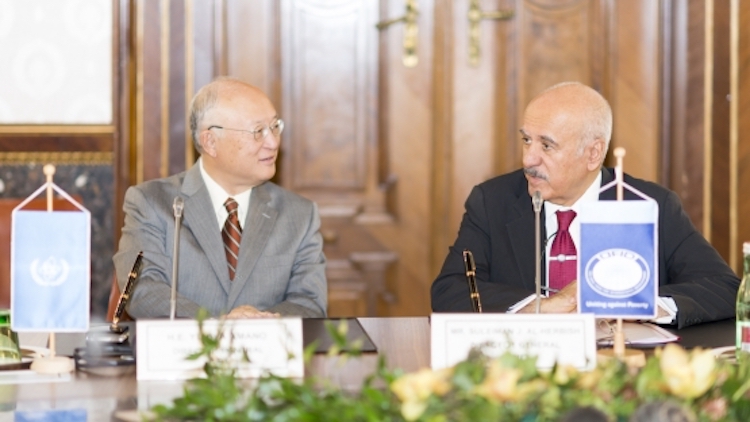By Jutta Wolf
BERLIN | VIENNA (IDN) – The Organization of Petroleum Exporting Countries (OPEC) Fund for International Development (OFID) has joined hands with the United Nations atomic energy agency in achieving Sustainable Development Goal 2 on ending hunger, achieving food security
Backed by the OFID grant of US$ 600,000, the International Atomic Energy Agency (IAEA) projects will benefit especially poor farmers in developing countries in Asia: Bangladesh, Cambodia, Lao PDR, Myanmar, Nepal and Vietnam.
OFID Director-General Suleiman J Al-Herbish and IAEA Director General Yukiya Amano signed an agreement for the purpose on December 21. Al-Herbish said: “Grant financing is an important part of OFID’s development operations and we are pleased to be working with the IAEA in support of agriculture in Asia.”
The grant funded projects fit with OFID’s energy-water-food nexus approach to development, said Al-Herbish, adding: “I regard this as yet another milestone in our exemplary partnership and cooperation with the IAEA in support of innovative solutions and interventions for the wellbeing of mankind.”
Yukiya Amano welcomed working with OFID again and emphasized the importance of science and technology in furthering development. He said that the supported projects would go some way to promoting best agricultural practices, benefitting many people on the ground in the targeted communities.
OFID’s grant will support two projects that build on earlier IAEA interventions. The first, which will receive US$200,000, will advance the application of nuclear techniques for the diagnosis and control of trans-boundary animal diseases (TADs), especially foot-and-mouth disease, in Cambodia, Lao PDR, Myanmar and Vietnam.
Primary activities will include training in the diagnosis, detection and vaccine control of TADs and the provision of equipment and supplies to animal health laboratories in the recipient countries. These components are expected to boost the capacity of laboratory staff and benefit around 1,400 animal breeders, as well as the population at large due to the anticipated increase in livestock production, higher incomes and improved food security.
“Early and rapid detection of animal pathogen is key to halting the spread of the diseases,” the IAEA said, adding that while conventional methods can detect the viruses, they take a long time and cannot determine their behaviour or genetic character – which is required for a rapid response.
Under the grant, the IAEA, in cooperation with the UN Food and Agriculture Organization (FAO), will train veterinarians from the four Asian countries in the diagnosis and control of the diseases.
Another project will be allocated US$400,000 to promote sustainable rice production systems with a focus on strengthening soil and water management techniques and capacity building among farmers, scientists and national partners in Bangladesh, Cambodia, Lao PDR and Nepal.
Countries in Asia – which produce 90 per cent of the world’s rice – have seen fluctuating yields in recent years due to rising temperatures that bring new plant diseases and insect pests, extreme floods and droughts as well as a rise in sea levels leading to increased soil salinity and lower soil fertility in coastal areas.
The project will benefit targeted populations, especially the poor, who will have access to more affordable, high-quality rice. The improved technologies will also help reduce greenhouse gas emissions that result from rice production.
OFID said, it has extended 12 grants totaling US$2.4 million to the IAEA since 1989 in support of health and agricultural projects in Africa, Asia and Latin America. [IDN-InDepthNews – 30 December 2017]
Photo: IAEA Director General Yukiya Amano (left) and OFID Director-General Suleiman J Al-Herbish (right) at the conclusion of an agreement to increase food security and promote sustainable agriculture in Asia. Credit: OFID.
IDN is flagship agency of the International Press Syndicate.
facebook.com/IDN.GoingDeeper – twitter.com/InDepthNews

